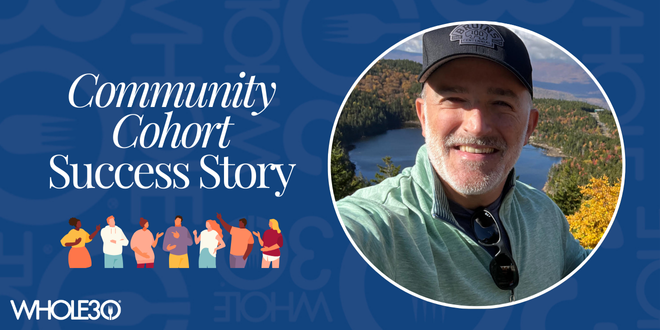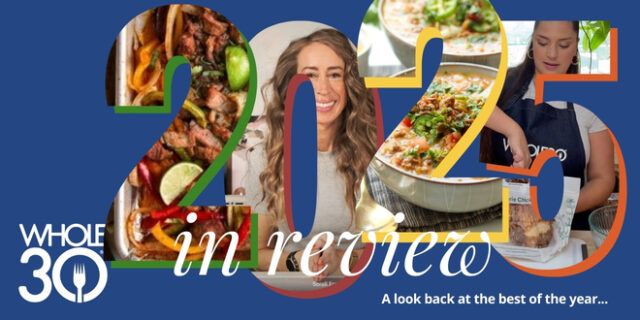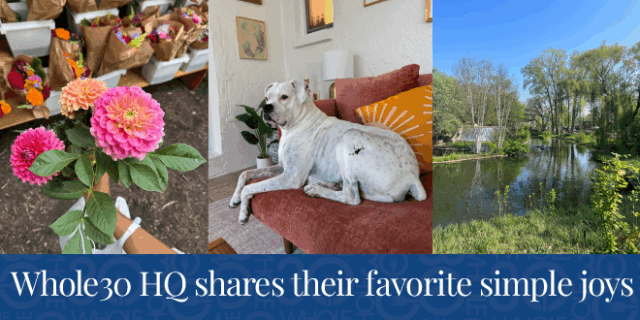Over the last decade, David C. has repeatedly turned to the Whole30 program to keep his habits on the right track. And it’s a path he hopes will lead him to the long-term health he seeks.
“At this point in my life, where I’m in my upper forties, I recognize that I’d like to have the greatest health and well-being that I can have as I move into my fifties and sixties and seventies and beyond,” David said. “I recognize that the habits I’m cultivating now can help me accomplish that later.”
He recognizes health and wellness is a lifelong process that has its ups and downs. But whenever he drifts off the path, the Whole30 has been there to help David steer back into a lifestyle that better fits his goals.
“Sometimes we shift and move in a direction that doesn’t serve us really well,” he said. “It can take that kind of firm experience of boundaries and commitment to move in a direction where you no longer need such firm boundaries… The Whole30 makes sense because it’s not an extremist diet. It’s just eating whole foods.”
“There’s no gimmick to Whole30—it’s just a way of eating that is healthy and balanced. I think what makes me come back to Whole30 is that it provides an experience where the boundaries are really clear so that I can give myself an experience so that I can get out of unhealthy habits.”
Challenging in the best way
David’s first Whole30 was around May 2015, and it was a powerful experience.
It all started in his CrossFit gym in Connecticut. One of the coaches there ran a Whole30 for the group. David hadn’t heard of the program, but decided to try it out. The frequent emails of encouragement and motivation, a cooking class, and plenty of community support helped that first Whole30 experience leave a lasting impression on David.
“It was challenging, but in the best possible way,” he said.
Many other Whole30s have followed. Sometimes in groups. Sometimes alone. Sometimes with one-on-one support. But by the time David signed up for his first Whole30 Community Cohort, he was happy to be back with a large support system.
“It felt like I was just able to dip into a well of community,” David said. “Affirmation and motivation was exactly what I needed to not just complete the Whole30, but to extend my experience this most recent time into something much more long term.”
This fruitful group experience came at a time when David needed it most. His previous Whole30s had him eating really well overall, but—as they often do—stressful events cropped up to throw him off-balance and steer his habits in a less healthy direction.
“When I’m experiencing a lot of stressful situations, I use food to somehow medicate myself,” David said. “Oftentimes that’ll be some form of sugar, like chocolate or something like that. I was just in a pattern of eating not nearly as well as I had been in the year or two prior to that… I could sense that I really needed to be part of a group.”
Those tendencies—and the craving to turn to sugar for relief—didn’t disappear the day David started the Cohort. But when they popped up again, he was able to rely on the commitment he made to himself and the accountability he had with his Cohort community.
“I was part of a cohort of people who were also agreeing to do [the Whole30],” he said. “That gave me the motivation to shift out of the cravings that came up.”
Finding his food freedom
After the Whole30 Community Cohort experience, David started working on living his preferred food freedom lifestyle. He’s feeling good about his progress so far—about carving out boundaries in his diet and social life.
“Today I met with a friend at a cafe that I was going to a lot before work prior to the Whole30,” David said. “It’s a really nice place and they have really good coffee, but they also have these pastries that are to die for. They have this lemon polenta cake that I always would get… If I had been in this place where it’s really worth it this morning to have that lemon polenta cake, I would have. But it wasn’t worth it, and I didn’t need it. So I really enjoyed my cup of black coffee and I felt really good about that.”
In the past, David may have ordered after having a familiar conversation in his head about deserving the treat because he had been so good recently. This Whole30 has helped David come at the decision from a different, more food-freedom-centric perspective that’s also grounded in his health goals.
“It’s just about asking, ‘What do you want?’ And I want long-term health,” he said. “But if I really wanted lemon polenta cake, I would have had it. I just didn’t”
That realization is a powerful one. You can have the lemon polenta cake if it’s worth it. And if it’s not worth it, passing is an equally good decision. Removing the judgment and the cravings are huge non-scale victories (NSVs) that will help David build a lasting food freedom that joyfully supports his goals.
“It’s not perfect, and I don’t feel like I’m not being as strict as I was in the Whole30,” he said. “But I’m feeling better about just saying, ‘I’m not going to have that, or I am going to have this.’”
Lessons for the long term
Part of succeeding in any lifelong pursuit, like health and well-being, is committing to taking the journey. And doing so with an openness to change, learning along the way, and adapting to new information. David has learned that the program can bring powerful, positive results—whether it’s your first or seventh time doing it.
“The Whole30 is just helping me feel better about myself,” David said. “I think that when I feel healthier, like physically, I also feel better about myself. Then that spills out into the rest of my life, whether it’s personally or professionally… This provides a way for me to have more physical well-being, which I think spills into me having better emotional and psychological well-being.”
For David C., that 30-day investment always pays off in new, helpful ways. That effectiveness is why the program continues to be part of his lifelong health journey.
“What I appreciate about the Whole30 experiences, it’s only 30 days, but it works,” he said. “It is enough time to give my mind, my nervous system, my body, the time it needs to move into a direction that serves me better. It’s not just that I feel better about myself at the very end of it, but that I’ve noticed that I can use that 30-day experience to really move into a direction that serves me better in the long run.”
Interested in Cohort success stories? We can help with that. (You can also check out other inspirational Whole30 success stories in our Testimonials section.) If you’re a community person like David, you can also learn more about the Whole30 Community Cohort.















